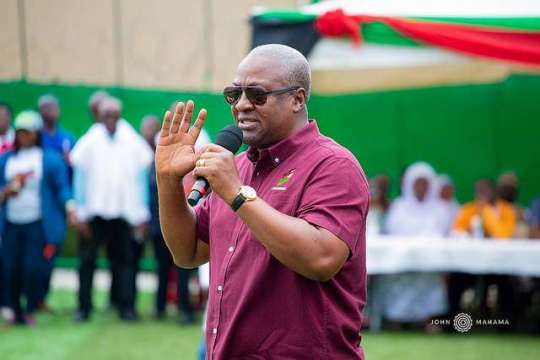Mahama justifies first-year academic fees waiver, vows to cut wasteful spending

John Dramani Mahama, the 2024 flagbearer of the National Democratic Congress (NDC), has defended his party’s proposal to cover academic fees for first-year university students if elected, following criticisms about the policy’s feasibility.
Critics, including the Director of Academic Quality Assurance at the University of Ghana, Professor Daniel Kwabena Twerefou, have questioned the viability of such promises, warning that they could strain the nation’s limited resources. Mr. Twerefou expressed concern about the “free this and free that” approach, suggesting that government focus on creating employment opportunities for graduates rather than offering free services.
“I have a little problem with the free this and free that and sometimes we even say free without knowing how we are going to get money to pay for it. Generally, what is happening is that we do have an overproduction of graduates who are not getting jobs to do, and they are all loitering in the house doing nothing and becoming a burden to their parents? So I will rather suggest that the government focuses more on putting resources in areas that will generate employment for students and for the parents”.
However, during a Youth Town Hall Meeting at Ho Technical University, Mahama addressed these concerns, arguing that the initiative could be funded by cutting wasteful government spending. He highlighted the high costs of presidential cabinet retreats, which he claimed could be redirected to support the policy.
“At the presidency, one cabinet retreat costs almost 5 million Ghana cedis. There is so much waste in the system. The office of the President’s budget alone can be cut to raise enough money for all Level 100 students.
“The budget for the Presidency is 2 billion Ghana cedis every year. It is even now that IMF has come in that they have cut it down. At a point, it used to be over 3 billion Ghana cedis every year and you say we cannot find 270 million Ghana cedis to ease the fee stress of our students who are coming to their first year in university.”
Despite Mahama’s assurances, some students remain skeptical about the policy’s feasibility and sustainability. Students from the University of Ghana expressed doubts, with one suggesting that the pledge is merely a tactic to secure votes in the upcoming election, while others questioned whether the country could afford such an initiative given the current economic climate.





